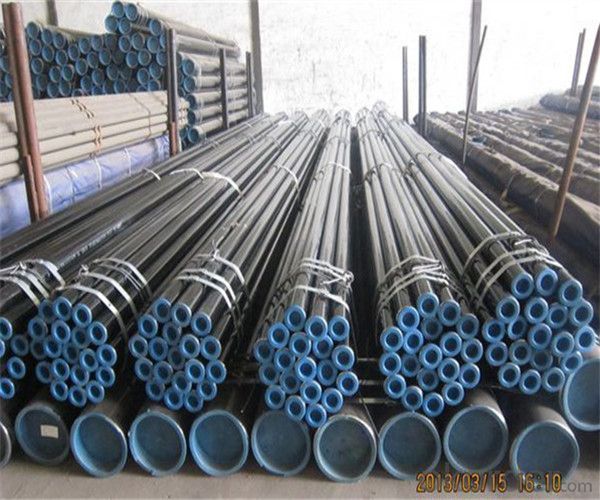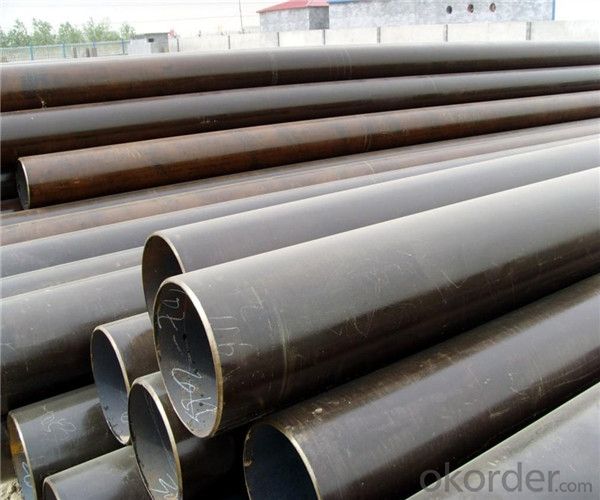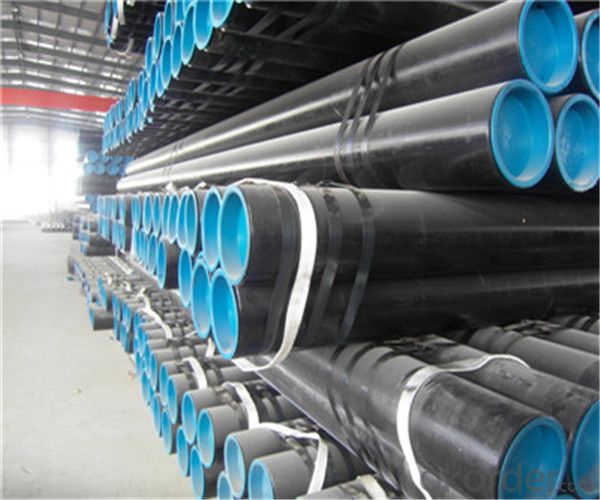Seamless Steel Pipe with Best Price and High Quality/Hot Sell
- Loading Port:
- Tianjin
- Payment Terms:
- TT OR LC
- Min Order Qty:
- 100 m.t.
- Supply Capability:
- 2000000 m.t./month
OKorder Service Pledge
OKorder Financial Service
You Might Also Like
PRODUCT DETAILS
1.Structure of Seamless Steel Pipe Description:
A large amount of Seamless Steel Pipes is offered to the clients at cost effective rates. These pipes are extremely durable, resistant to corrosion and have high tensile strength. Our pipes are used in nuclear plants, power plants, refineries and construction industry across the country. Furthermore, we are capable of providing these seamless pipes to the clients in bulk quantity.
2.Main Features of the Steel Pipe:
• High manufacturing accuracy
• High strength
• Small inertia resistance
• Strong heat dissipation ability
• Good visual effect
•Reasonable price
3.Seamless Steel Pipe Pictures:



4.FAQ of Seamless steel pipe:
①How is the quality of your products?
Our products are manufactured strictly according to national and internaional standard, and we take a test
on every pipe before delivered out. If you want see our quality certifications and all kinds of testing report, please just ask us for it.
Guaranteed: If products’ quality don’t accord to discription as we give or the promise before you place order, we promise 100% refund.
②How about price?
Yes, we are factory and be able to give you lowest price below market one, and we have a policy that “ for saving time and absolutely honest business attitude, we quote as lowest as possible for any customer, and discount can be given according to quantity”,if you like bargain and factory price is not low enough as you think, just don’t waste your time.Please trust the quotation we would give you, it is professional one.
③Why should you chose us?
Chose happens because of quality, then price, We can give you both.Additionally, we can also offer professional products inquiry, products knowledge train(for agents), smooth goods delivery, exellent customer solution proposals.Our service formula: good quality+good price+good service=customer’s trust.
SGS test is available, customer inspection before shipping is welcome, third party inspection is no problem.
Any question, pls feel free to contact us !
- Q:What are the different sizes of steel pipes available?
- Steel pipes are available in a wide range of sizes, ranging from small diameters of around 0.5 inches to large diameters of up to 72 inches or more. The specific sizes of steel pipes vary depending on their intended use and application, with common sizes falling within the range of 1/8 inch to 36 inches in diameter.
- Q:How are steel pipes made?
- Steel pipes are made through a process called pipe manufacturing, which involves several steps. First, raw materials such as iron ore, coal, and limestone are melted in a blast furnace to produce molten iron. The molten iron is then mixed with recycled steel and processed in a basic oxygen furnace or electric arc furnace to refine its composition and remove impurities. Once the desired steel grade is achieved, it is cast into billets, which are heated and pierced to form a hollow cylindrical shape. These pierced billets are then elongated and shaped into pipes through a process called hot rolling or cold drawing. Finally, the pipes undergo various finishing operations, such as straightening, cutting, and inspection, before being ready for use in various applications.
- Q:How are steel pipes used in oil refineries?
- Steel pipes are used in oil refineries for various purposes such as transporting crude oil, refined petroleum products, and other chemicals throughout the facility. They are crucial for the overall infrastructure, including piping networks, storage tanks, and processing units, ensuring efficient and safe fluid flow.
- Q:What is the difference between steel pipes and plastic pipes?
- The main difference between steel pipes and plastic pipes lies in their material composition. Steel pipes are made from a durable and strong metal alloy, while plastic pipes are composed of various types of plastic polymers. This difference in materials leads to variations in their properties and usage. Steel pipes are known for their high strength, resistance to extreme temperatures and pressures, and longevity, making them suitable for applications requiring robustness, such as in industrial settings or underground pipelines. On the other hand, plastic pipes are lightweight, flexible, and corrosion-resistant, making them ideal for plumbing, irrigation, and other non-industrial applications. Additionally, plastic pipes are easier to install and handle due to their lighter weight and flexibility compared to steel pipes.
- Q:What's the gate number of the precision steel pipe?
- Precision steel pipe refers to the high precision steel pipe, the wall thickness and internal and external diameter can be controlled within 10 wire tolerance range
- Q:Is the same specification seamless steel pipe more expensive than welded pipe?
- You need to see this in the interval that diameter, such as seamless pipe and welded steel tube 530*20 mm compared to 5450 yuan per ton, seamless pipe, welded steel pipe, which is 4550 yuan, small diameter 10*2 mm, seamless pipe will require far 10000 per ton, just need more than 6000
- Q:What are the different types of steel pipe bends for pipeline routing?
- There are several different types of steel pipe bends commonly used for pipeline routing. These include 90-degree bends, 45-degree bends, and custom bends with specific angles as per the pipeline design requirements. Each type of bend serves a specific purpose in redirecting the flow of fluids or gases through the pipeline while maintaining structural integrity.
- Q:How do you measure the thickness of a steel pipe?
- To measure the thickness of a steel pipe, you can use various methods depending on the precision required and the tools available. Here are three common approaches: 1. Calipers or Vernier Calipers: Calipers are a simple and widely used tool for measuring thickness. Open the calipers and place the jaws on either side of the pipe, ensuring they are perpendicular to the surface. Close the jaws until they lightly touch the pipe, then read the measurement on the caliper scale. 2. Ultrasonic Thickness Gauge: This method offers more accurate results and is often used in industrial settings. An ultrasonic thickness gauge emits high-frequency sound waves that penetrate the steel pipe. By measuring the time it takes for the sound waves to bounce back, the gauge calculates the thickness of the pipe. Ensure the pipe surface is clean and smooth before taking the measurement. 3. Magnetic Thickness Gauge: This method is specifically designed for measuring the thickness of ferrous materials like steel. The gauge contains a small magnet that adheres to the pipe surface. By applying a magnetic field, the gauge measures the distance between the magnet and the base plate. This distance corresponds to the thickness of the steel pipe. It's important to note that each method has its own accuracy limitations, and the choice of measurement technique should be based on the desired precision, availability of tools, and the specific requirements of the application.
- Q:How to perform nondestructive inspection of steel tubes
- Including fluorescence, coloring two kinds. Because of its simple equipment and convenient operation, it is an effective method to check the surface defect of magnetic particle inspection. It is mainly used for surface defect inspection of non-magnetic materials.
- Q:Can steel pipes be used for wastewater treatment systems?
- Yes, steel pipes can be used for wastewater treatment systems. Steel pipes are commonly used in wastewater treatment systems due to their durability, strength, and resistance to corrosion. They are able to withstand the harsh conditions and chemicals present in wastewater treatment processes, making them a reliable choice for transporting and distributing wastewater within the system.
1. Manufacturer Overview |
|
|---|---|
| Location | |
| Year Established | |
| Annual Output Value | |
| Main Markets | |
| Company Certifications | |
2. Manufacturer Certificates |
|
|---|---|
| a) Certification Name | |
| Range | |
| Reference | |
| Validity Period | |
3. Manufacturer Capability |
|
|---|---|
| a)Trade Capacity | |
| Nearest Port | |
| Export Percentage | |
| No.of Employees in Trade Department | |
| Language Spoken: | |
| b)Factory Information | |
| Factory Size: | |
| No. of Production Lines | |
| Contract Manufacturing | |
| Product Price Range | |
Send your message to us
Seamless Steel Pipe with Best Price and High Quality/Hot Sell
- Loading Port:
- Tianjin
- Payment Terms:
- TT OR LC
- Min Order Qty:
- 100 m.t.
- Supply Capability:
- 2000000 m.t./month
OKorder Service Pledge
OKorder Financial Service
Similar products
New products
Hot products
Related keywords































